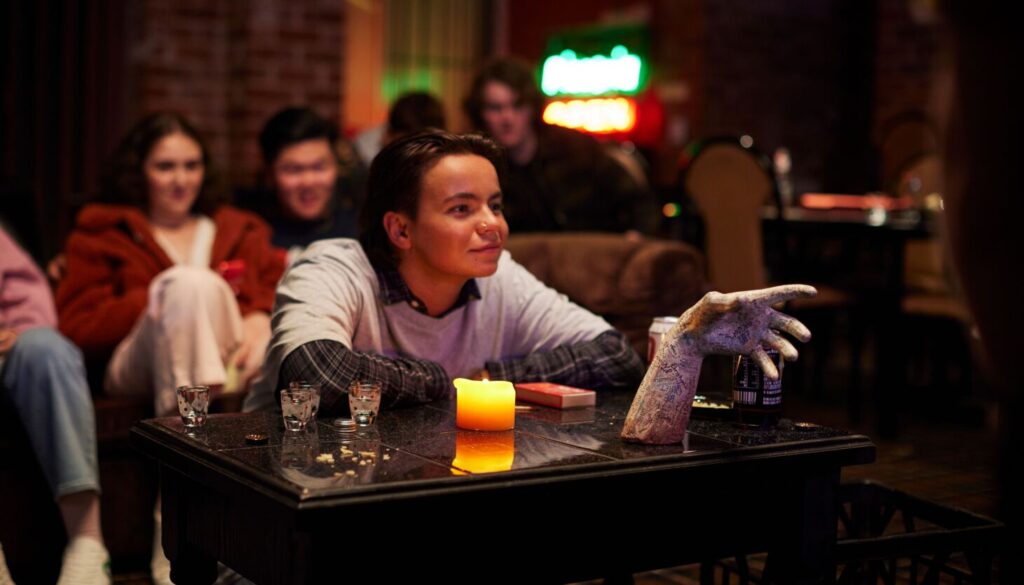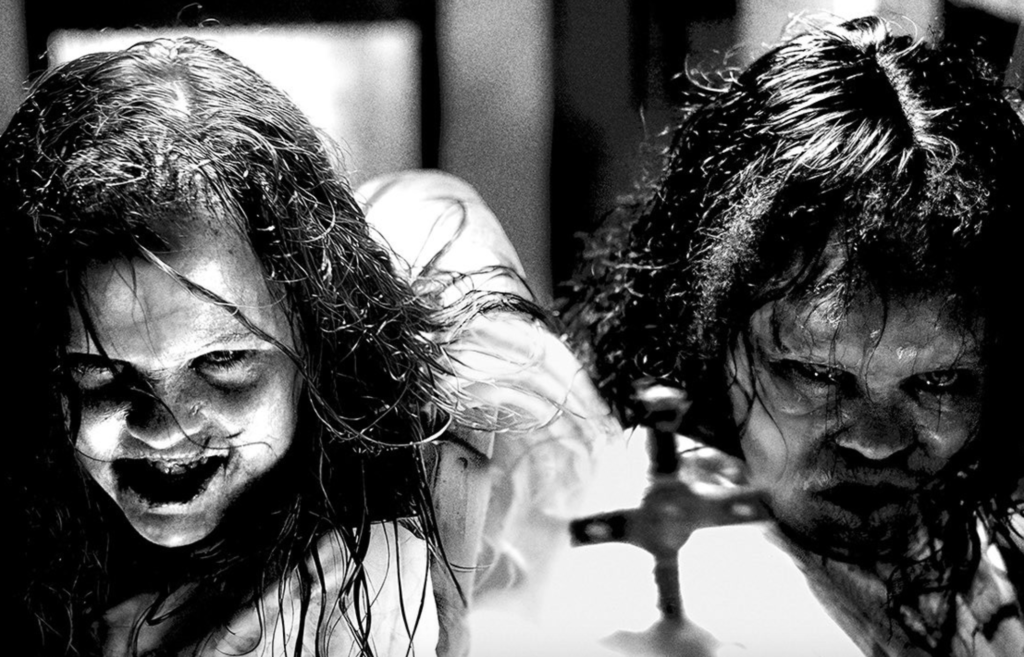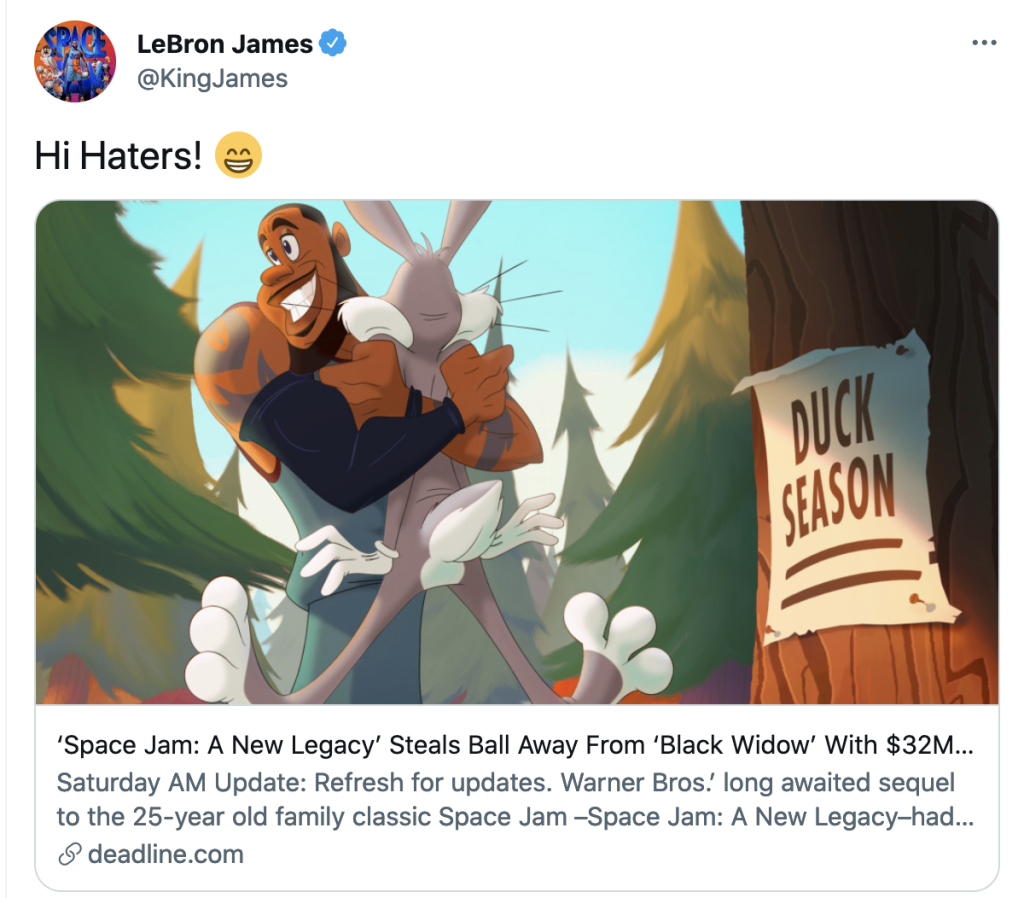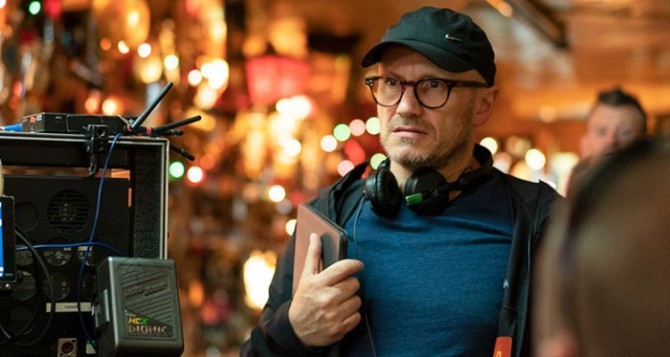Search Results for: The Days Before
Genre: Sci-fi
Premise: A man who possesses a time travel device uses it to go back in time to prevent an alien invasion.
About: Oh how quickly fortunes change. Chad St. John is a writer nobody had even heard of last year. Now he’s on fire. And I’m not talking about that wussy orange fire either. I’m talking the steel-melting blue type of fire. With two scripts on this year’s black list, one of them in the top 10, and a script sale just the other week which is supposed to do for Westerns what Pirates of the Carribean did for pirates (it’s called “The Further Adventures of Doc Holliday”), it’s definitely St. John’s Hollywood. The rest of us just live in it.
Status of this draft: 2nd Draft
Status of project: Development
Writer: Chad St. John
Details: 111 pages (undated)

There are times when scripts don’t get a fair shot with readers. Maybe the reader is tired. Maybe the reader got in a fight with her boyfriend. Or, worst case scenario, maybe the reader was forced to watch “Alvin And The Chipmunks: The Squeakel.” Whatever the reason, sometimes readers open a script with the attitude of, “You better fucking impress me.” Harsh? I’d reckon so. But sweetheart, when the world’s pushing your buttons, you need a place to push back. And unfortunately, sometimes that place is work. I just saw it happen the other day in fact. I was at the supermarket and one of the cashiers – a nice portly guy in his 50s who always had a big smile on his face – had to repair a register in a closed line. One of the other workers saw him and erroneously assumed he was opening up. So he got on the P.A. and said, “Lane 5 is now open. Lane 5.” Everyone from the overflowing lines rushed into Lane 5 and this cashier flipped the fuck out. He threw up his hands and screamed, “What are you doing! I never said I was opening! How dare you! I never said that! I never said that once! GOSH!!” He then charged off like a little boy who’d just had his candy stolen and disappeared into the back room. This left the entire store in shocked silence (except for me – I had a big smile on my face because I had stayed in line and not lost my place. Heh heh, yes, I’m a sick human being). The point is, I’d never seen that man exhibit anything even close to bad behavior before. It was clearly a bad string of events that came to a head. Believe me, readers have those days too.
The reason I’m telling you this is because I remember the circumstances under which I read The Days Before. And looking back on it, I didn’t give it a fair shot. I had a ridiculous amount of scripts to read that week. And by ridiculous, I mean 30. Also, for maybe the first time in my life, I decided to buy groceries in bulk, so I had purchased over $170 worth of groceries I planned to last me for three weeks. Ten minutes after I got home, the power on my block went out. FOR TWO DAYS! This ruined nearly 80% of the food I bought. And yes, even though it’s cliché, in addition to this I was having girlfriend problems! I came into that script with a chip on my shoulder the size of Ellen Page’s forehead. Instead of inviting the writer into my home, I stuck a gun to his head. “This better be good!” Ehhhh, needless to say I don’t think I was in the right state to read The Days Before. So because everyone’s been e-mailing me asking me to review it, I decided to wipe the slate clean and start all over again. I would give St. John another chance.
So let me be the first to say: Holy f’ing mother of balls was I wrong.
This script is all types of awesome. It starts with a grizzled mess of a man, Smith, and his wise-cracking tough-as-nails wife, Riley, barreling towards the White House in a Bonneville. These two are met with the typical response one would expect plowing your car forward at 86 miles an hour towards the White House post 9/11. With lots of SWAT and Secret Service bullets. They survive the onslaught but are captured and stuck in separate interrogation rooms. What each of them tell their captors, is that they’re, you know, from the future, and they’re, you know, trying to save the planet. Their warnings are ignored and mere minutes later, big bad dragon-like alien creatures appear and start killing everyone in sight. Including our president and even Riley. It’s not easy watching your wife die. But if there’s anyone conditioned for it, it’s Smith. He’s watched her die 109 times.
Luckily, Smith jumps back in time before these things can catch him. When? Exactly one day before. The alien Blackberry device he’s stolen from these creatures only allows him to jump back one day at a time – or at least, that’s the only type of time jump he’s been able to figure out. It’s not like the thing comes with an instruction manual. Oh, and he’s been doing it. For seven years. Each day coming back and trying to warn his president, his country, his planet, that there’s an alien race ready to invade the planet and kill everyone on it.
But this time when he jumps back, it’s different. He’s amassed enough video evidence, among other things (cutting off the president’s finger after he died) to finally step up to the table with a case. And it’s a compelling one, so much so that they listen to his pleas. The thing is, there’s nothing they can do about it. These aliens are thousands of years more advanced than them. And there’s millions of them. Maybe even billions. It’d be like us jumping back in time and starting a war with the cavemen. However, using classified technology developed by the creepy Dr. Oro, they realize they can send a message back in time 15 years to tell the planet what’s going to happen. As the aliens once again – like they always do – appear in this time and start obliterating the world, the humans are able to get the message out, and Smith and Riley barely escape to jump back in time one more day…
Into a completely different world. A broken down militarized world that for 15 years has been preparing for this day, the day the aliens arrive. Every single cent that every nation has earned has been used on creating a state of the art military. Anyone not with the program, has been forgotten. The streets are Sarajevo. It’s the Third Reich. And yet it has to be. The world has been preparing to save itself, to fight back, and militarizing itself was the only option. Ain’t no giant trees making out with animals here. This is hard core live or die.
The rest of the script then focuses on the hours leading up to the invasion. And it’s beyond captivating, as we’re wondering: Can they do it? Can they actually defeat this race that regularly wipes out the entire planet within minutes? This is fucking “Aliens” times a million!
The really cool thing about this script is that it makes you think. It makes you think about what our world would be like if we spent every single available dollar on our military. It makes you think about whether we would force children to fight. Hey, sure they’re children, but this is the end of the world we’re talking about here. Might as well increase our numbers. And unlike, say, Independence Day, you’re so invested in the characters that it makes you step back and wonder what you would do. Would you cower in fear? Or would you rise to the occasion?
Are there complaints? Well…yes. Some of the over-the-top banter between Dr. Oro and Riley, who say things like, “That is one saucy piñata,” followed by “Get me down, you big Wienie!” was too much to take. “Pervy nerds. Man eating growly things. Bombs falling from the sky. This is the worst Christmas ever!” sounds more like a sitcom than an end of the world film to me. I remember that this is what bothered me so much when I first read it. I immediately thought, “This is going to be another one of those lame action movies with the wanna-be Bruce-Willis’esque action hero spouting out clever line-age. I assigned the script that label way too early, which prevented me from seeing just how much more there was here. St. John has really thought everything through in this world. And while there are holes (It’s impossible to write a time-travel movie without them) they’re minimal enough so that they don’t hurt the story.
The Days Before is a freaking sweet script. It’s “Independence Day” with a brain (and, uh, a script!). Don’t know what Warners’ plans are with this, but I’d be putting it into production today. Or, err, I mean yesterday. :)
[ ] What the hell did I just read?
[ ] wasn’t for me
[ ] worth the read
[x] impressive
[ ] genius
What I learned: So yeah, regarding the “You better impress me” stuff. You have to remember that readers read *FOR THEIR JOB*. They’re not clearing out their day so they can read your script next to a fire with cookies and warm milk. They’re trying to make it through. That’s their job. Make it through the script remembering just enough to write cohesive coverage. This is why I tell writers they can never half-ass it. That every scene and character and story element they include has to be fucking awesome because you never know what kind of mood or situation that reader is going to be in when they sit down with your script. Assume the worst. That your reader is a bitter old man who hates movies and hates his job. If you can win him over, you can win anyone over!

So I’m sitting there watching Talk to Me, the A24 Australian horror movie you might have seen the trailer for. It’s the one where a bunch of teenagers are in a basement and one of them holds a hand statue and then goes into some sort of trance.
The movie is pretty good. But it made its fair share of screenwriting errors. Basically, the plot goes like this. A teenage girl, Mia, hangs out with this family all the time because her mom died. She’s got her friend, Jade. And then Jade’s younger brother, Riley.
This trio occasionally hangs around a cool group at school, led by tough-chick Hayley, and Hayley’s muscle, Joss. This group loves to play this game called, “Talk to Me,” where they bring out a hand statue, strap you into a chair in front of it, you hold the hand and say, “Talk to me,” then follow that by saying, “I let you in.”
As soon as you say, “I let you in,” whoever’s in the chair sees a [usually gruesome] dead person sitting in front of them. Nobody else in the room can see this. Just the person in the chair. This creates a level of doubt where everyone can write the experience off as fake, much like when two people push the planchette on a Ouija board. You can always blame the other person as the pusher.
Except everyone in the room participates in the experience so that sort of negates the idea that they’re faking it. But we’re not going to nitpick.
Mia seems particularly affected by her experience, where she saw a couple of gnarly dead bodies. But it’s when Riley goes under that the crap hits the air conditioner. Riley is channeling Mia’s dead mother.
Mia is so taken by the chance to talk to her mom that she prevents Riley from stopping the experience before the mandatory 90 seconds. Riley starts going ballistic, bashing his head into anything he can find, nearly killing himself before they’re able to detach the hand from him.
This results in Mia being banished from the family, which sends her back home to hang out with her dad. When Mia sees her mother’s apparition again, she finally answers the question about whether she killed herself. She didn’t. And the person who did is two rooms away from her. Her father. Time to run.

You may have snooped out a couple of the screenwriting issues from that synopsis. The first is that the possession rule is shaky. In fact, we’re not even sure people are being possessed for three-quarters of the movie. Mia is not possessed despite going through the process. She sees other spirits, like her mom. But she’s not possessed.
Then, near the end, we lean heavily into the injured Riley being possessed. And then, of course, Mia’s father being possessed. Whoever’s inside of her dad is trying to kill her.
You can tell that the writers started to realize near the end of writing the screenplay that, “Oh, they’re possessed! So we can do something with that!” So then they rush to pay off a possession storyline that they never really set up.
It’s fine to do this. It’s a natural part of screenwriting. You figure things out while you’re writing the script. But once you figure something big out, you have to go back and properly set it up.
Ditto the dad. They didn’t even mention the dad for the first 70% of the movie! I didn’t know she had one. How could I? She was always at this other house. And the writers leaned heavily into this idea that this other family was taking care of Mia. So we assumed she didn’t have family.
To not only tell us she had family, but to build the crux of Mia’s entire storyline around what her father did to her mother was clunky to say the least. A good screenwriter is going to realize that if they want to use this ending, they need to go back into that first act and properly set up the dad. Then keep him in the story throughout the second act.
As I was pondering all this, a question popped into my brain: Does it matter? Or, more specifically, would this have mattered in regards to how well the movie did? It’s got a 94% critic score on Rotten Tomatoes. It’s got an 82% audience score. It made 50 million dollars in the U.S. and nearly 90 million worldwide.
Would making those changes have affected these numbers in a positive way? Because if you look just at the movie, it’s really well put together. The main actress who plays Mia, Sophie Wild, is great. She’s going to become a star. The rest of the cast is really good. There are no weak links.
The cinematography is great. The directing overall has no weaknesses (they were particularly convincing in creating a “teenage atmosphere”). Also, the hand sequence WORKS. Whatever it is at the center of your fantastical story, it has to be convincing for the viewer to suspend their disbelief. If it’s hokey or dumb, they’ll immediately check out. And the “talk to me” stuff was perfect.
Most importantly, the movie was scary. I did the thing where I put my arms up in front of my face half-a-dozen times cause I saw something weird in the corner and it started moving and I didn’t want to know what the f*** it was.
So, if you do those things: You have a convincing mythology, you have plenty of legitimate scares, you have characters who we’re on board with – you can make screenwriting mistakes and it be okay. It’s similar to what I tell comedy writers. If your script is funny, you can have the worst plot ever. It doesn’t matter. Ditto with horror. If it’s scary, you can make mistakes.
But the purist in me still believes that if you fix those mistakes, your movie is going to have better word-of-mouth which means more people are going to want to see it. I think it’s telling that the audience score is lower than the critical score here. Audiences may have been a little frustrated by the sloppiness in the storytelling.

Look no further than what happened to Exorcist: Believer this weekend. Now I didn’t see the film. But I knew that the baseline they were building predictions off of was 30 million. Because that’s what the predicted ROI was for this particular advertising package. Now, the box office could go well above that number or below it. And it depended on if the story was good.
Guess what?
It wasn’t good. It has a 22% Rotten Tomatoes score and a 59% Audience score (which will probably go down once more reviews come in). It was made clear early on on social media that this one was a stinker. And so all those potential moviegoers who were thinking about going on Saturday who were going to pump up that box office to the high 30s, maybe even 40 million dollars, they decided to stay home, and the movie made 27 million bucks.
In David Gordon Green’s defense, I’ve never been able to figure out the key difference between an exorcism movie that works and one that doesn’t. For all intents and purposes, the original Exorcist should not have worked. It’s long. We’re stuck in this house the whole time. Some characters disappear for 90% of the movie. Others show up halfway into the movie.
I just remember that movie feeling so real. It felt like how an actual exorcism situation would happen. That realism is what sold it for me. And even though all these exorcism movies since have given us convincing possession performances, none of them has felt as authentic as The Exorcist.
In other words, trying to recreate the authenticity of one of the most authentic horror movies ever is a hard task to pull off. None of the other Exorcist sequels have been able to do it. I’m shocked, like the rest of the industry, that Universal paid 400 million for the rights to try and change that pattern. A lot of people thought they were dumb. Believer’s critical and audience reception is proving them right. It looks like this franchise is going to end up on the bottom of a concrete stairway.
Genre: Sci-Fi/Drama
Premise: A young woman and her devoted boyfriend’s lives are dramatically altered by a medical procedure that could potentially quadruple their lifespans.
About: Clearly, Matt Kic and Mike Sorce have a love for weird life-extending dramatic sci-fi ideas. They sold a script to Netflix in 2019 called, The Second Life of Ben Haskins, about a guy who gets cancer then goes into stasis until they can transfer his brain into a new body. So this is well-tread territory for them. By the way, these two loved contests before they sold their first screenplay, and the good news for all you aspiring screenwriters out there is, THEY NEVER WON! They semi-finaled a lot. But that’s as far as they got. To be honest, semi-finaling is usually a good sign in contests because often contests want to celebrate an artsy or profound script, which leaves the Hollywood scripts – the cool higher concept ideas – back in the semi-final round. So next time you semi-final in a contest, start looking for houses in the hills cause you’re about to hit it big!
Writers: Matthew Kic & Mike Sorce
Details: 118 pages

Today’s screenplay has a whopper of a twist. But does that twist result in a script worth reading? Let’s find out!
Maddie and Julian, both eight years old, are inseparable ballet dancers. They’re best buddies times a million. After a strenuous day of practice, Maddie gets word that her father is in the hospital. Her mother races Maddie there and her dying dad cryptically tells her not to screw up her life like he did.
Twenty years later, Maddie is still dancing and STILL with Julian. The two are so in love they got matching birdcage tattoos on their wrists. Maddie is a nurse at a place called Dohrnii Medical where she changes bed pans for a guy known as “Gramps,” and has daily battles with protesters, who are mad that Dohrnii offers a new medical procedure to increase your lifespan four-fold.
Maddie, who is still shaken by her father’s death, wants to get the procedure. But to do so would mean becoming sterile. This is something Julian does not accept. He wants to have many kids with Maddie. Maddie is so mad about Julian not wanting the procedure that she goes and bangs her new 40-something dance teacher, Mr. Ford. I’ve seen some rash decisions in my life but that was a little extra, Maddie.
When Julian next leaves town, Maddie secretly gets the procedure, which effectively ends their relationship. Before Maddie can process this, she finds out that her mom is dying. A week later, we’re at the funeral. Right before it starts, Mr. Ford shows up. After exchanging pleasantries, Maddie checks Mr. Ford’s wrist where we see… a birdcage tattoo?
Wait, wtf is going on here? Maddie gets birdcage tattoos with every guy she sleeps with? No. Actually. This is where we learn that Julian, Mr. Ford, and Gramps…. ARE THE SAME PERSON! We’ve been unknowingly jumping back and forth in time throughout the first 30 pages. Since Maddie doesn’t age, we just assumed all of this was happening in the present.
The rest of the script linearly follows Maddie in the year 2025, when she’s a hot mess alcoholic, in 2051, when she tries to conquer her dream of becoming a professional ballet dancer, and in 2083, where she looks back at all the dumb choices she made, particularly the one where she screwed over Julian. In the end, Maddie will learn whether becoming a “jellyfish” was worth it or not.
I think I would’ve titled this, “Hot Mess Jellyfish.” Cause it’s really about a character who is a total mess and has no idea what she wants, navigating her never-ending 20s over the course of 60 years.
I’m not sure how I feel about Jellyfish Days because it’s such a weird script. On the plus side, it’s not like anything else out there. On the minus side, it’s messier than my bedroom all throughout high school. It has these great moments, such as when we realize these three men we’ve been seeing have all been the same guy (Julian). And then it has silly moments, like this whole ‘follow your dream’ ballet storyline, which feels too lightweight for a movie tackling themes as heady as time and aging.
I do like that the script follows my advice of figuring out what’s unique about your concept and building your story around that. Because that’s going to be what separates your script from every other script. What’s unique about this story is that the main character lives for 300 years. So the writers smartly built in this storyline whereby we see all these aspects of Maddie’s life only to later learn they were happening in different time periods. That is a choice SPECIFIC to this concept.
I also thought it was a bold choice to drop that twist on page 30. Most writers would be tempted to save the twist til the end. The problem with saving twists for that long is that you have to lie for too long. You must strategically keep things out of the story that would normally be there. And if you do that enough, the story starts to feel distant, vague.
I’ll give you an example. Early in the script, Maddie and Julian have a fight about her getting the de-aging procedure. The next scene is her running through the rain to Mr. Ford’s house, ringing the doorbell, and when he answers, banging him. When I read that, I hated Maddie. She’s spent her whole life with Julian and all it takes is one argument to send her off having sex with her teacher?? Talk about a cold hearted b-word.
Of course, when we learn Julian and Mr. Ford are the same person, it makes sense. But had they waited until page 120 to tell us that, we would’ve hated her that whole time. And we would’ve been confused. There was nothing between her and Mr. Ford, up until that point in the movie, that would make you think she’d want to be with him. Of course, that’s because the writers can’t tell us too much lest we be onto them.
So it becomes this dance of lies you’re building and building for one shining moment at the end of the film. And while we’ve seen it work – The Sixth Sense – it more often than not doesn’t. So I like that these guys understood that and told us earlier.
I also like that the writers made some bold choices. For example, at first, I was annoyed by all the melodrama. Dad is dying of liver failure. Mom is dying of cancer. Big dramatic divorces are happening. These are the kinds of things you typically see in daytime soap operas. But the more I thought about it, the more I realized that all of this stuff fit the themes of the movie, which came down to the question, “What are the unique things you encounter when you live forever?” And experiencing a lot more heartache than the average person was a logical extension of that theme.
Still, the script is so freaking messy, it’s frustrating. Following your dreams is a subplot for an Addison Rae Netflix movie. It shouldn’t be part of a story trying to make this big profound statement. And then there’s this weird “secret son” storyline that pops up late. Apparently Maddie and Julian had a kid and she gave him up for adoption. But I thought the whole reason they broke up was because she wouldn’t have his kid. I had no idea what was going on there.
With that said, the script is one of those rare instances of something that’s discussion worthy. Yesterday’s script was the anti-discussion worthy script. But this actually has some stuff in it to talk about. And, for that reason, I’d say it’s worth checking out.
[ ] What the hell did I just read?
[ ] wasn’t for me
[x] worth the read
[ ] impressive
[ ] genius
What I learned: This script could’ve used one more plot point. We coasted after page 30, patiently moving through each of the three time periods Maddie lived in. And it got a little boring. An easy place to find a plot point in these high-concept scripts is to use the “and then sh#t goes wrong” tool. If your hero gains the ability to fly, at some point, sh#t needs to go wrong as a result of that power. If your hero gets into Harvard, at some point, sh#t needs to go wrong. If your hero wins the lottery, at some point, sh#t needs to go wrong. Sh#t going wrong is where all the fun is. The writers were so focused on the character side of this equation, they overlooked a potential ‘sh#t goes wrong’ plot point in Jellyfish Days that could’ve spiced up a slow narrative.
Is Space Jam 2 secretly a great movie??? Why did Black Widow drop so much in its second weekend? Has Cannes ever given the Palme D’or to a good film?? And Carson offers a book recommendation!
Out of morbid curiosity, I threw on Space Jam this weekend. It was on HBO Max 4 free so why not? My enjoyment of the film, if you can call it that, was inconsistent at best. There is only so much fun an adult can have with a movie that’s made for 11 year-olds. But when I turned off my brain and leaned into that kid who thought Saturday morning cartoons were the coolest most awesomest things that life had to offer, I enjoyed myself.
But I’m not here to review the film. I’m here because I had an epiphany while watching the movie. Are you ready for it? Here it is: Every screenwriter should write at least one family movie. Even if you never show that script to anyone, you should still write it. Let me explain why.
A family film allows you to practice executing all of the big screenplay beats without fear of overdoing it. Since family films are not put under the same microscope as, say, a David Fincher movie or a Noah Baumbach film, you can practice all of the things you’ve learned on screenwriting websites without having to worry about being too on-the-nose. That’s because kids movies ARE on-the-nose.
Take, for example, the hero’s arc. This is the most classic story beat there is. You have a main character. They have some sort of problem in their lives holding them back. The journey they go on is about realizing why this issue is hurting them, and ultimately learning that there’s a better, more fulfilling, way to live life. This transformation – or “arc” – leaves the audience feeling happy because they, too, have issues holding them back. They feel that if this movie character can overcome their flaw, they can overcome theirs as well.
But a character arc is quite a delicate measure to pull off. It looks easy when it’s done well but there are a lot of places where you can screw it up. A common issue is that the writer will say, “I don’t want to overdo it,” and be reallllllyyyyyyy subtle in how the flaw plays out. They’ll hint at it on page 30, hint at it again on page 50, before finally having them overcome it during the climax. When the reader asks, “What was that whole thing at the end where the hero said to his daughter he was going to donate his life savings to cancer research?” The writer replies, “It’s because he’s no longer greedy! The hero finally realized that money isn’t what matters. It’s family!” The reader responds with a side glance. “The hero’s flaw was that he was greedy?” And the writer dies a little inside.
The great thing about kids movies is that you can lean into this stuff and not worry about it coming off as corny or on-the-nose. In Space Jam, Lebron James’s son doesn’t want to be a basketball player. He wants to make video games. Lebron can’t accept that his son doesn’t want to play basketball and keeps pushing him to ditch the computer and practice his jumper.
After Lebron gets sucked into the Toon world, where he and the “Toon” squad are up against the “Goon” squad, Lebron keeps telling his teammates what to do. Move the ball up the court quickly. Set picks here. Step back, crossover when the other player is too close. Dunk. Etc. The results are not good. By halftime, they’re down 1000 points.
Lebron asks the team what’s up? Why are you playing so bad? They concede that they’re doing what he told them to do – be like him – but it’s not working. Lebron has his big epiphany. Just like with his son, everybody here has their own talents. He can’t make them be like him. He has to let them be themselves. Lebron has arced! And, of course, once the toons can start doing toon things (Roadrunner painting a fake desert canvas that the Goon players disappear into) they start winning.
Now some of you may be rolling your eyes. “SOOOOO ON-THE-NOSE. SOOOOO CHEESY.” That’s the point. You can’t learn to execute a flaw subtly if you’ve never executed a flaw effectively in any situation. This holds true for all the big screenplay beats: the inciting incident, the refusal of the call, the fun and games section, the midpoint escalation, the central relationship conflict, making the final goal seem impossible. When you write a children’s movie, you get to master all this stuff without the cynical rolling eyes of the high-expectation moviegoer.
Every genre has a slightly different expectation when it comes to screenplay beats. The kid’s movie is on-the-nose. The buddy-cop movie is a still on the nose but a little less so. The serious action movie, like Jason Bourne, is more subtle still. All the way up to Oscar dramas, where the goal is to camouflage your screenplay beats to such a degree that the audience is unaware that the movie was even written in the first place.
So go write that family film. The good news is that if it’s actually good, it’s one of the most profitable genres in the business. So you could get paaaaaaaaaid.
Moving along, Black Widow did not do well on its second weekend at the box office, dropping a widow-making 67%. For some reference, the last Marvel movie to be released, Spider-Man: Far From Home, dropped 51% on its second weekend. If we want a closer comp, we can use Captain Marvel, which dropped 55%. The reason 55% is so concerning is that Captain Marvel was a brand new character. Black Widow is a known character who had been around for a decade. If anyone should have the lower drop, it should be the proven character.
What does this mean? Hard to tell. Everything in the post-pandemic box office world is hard to gauge. Who knows how many people are buying the movie from Disney’s “Premiere Access” service. To be honest, as I’m writing this, I’m not even sure if they’re including the money they got from Disney + in that final box office haul or not. If it is included, that means even fewer people went out to watch the movie.
I did hear something interesting about Black Widow from Half in the Bag’s review this week where they said Marvel starts creating their action set pieces before the director has even been chosen. I don’t know how accurate this information is and I’m sure it differs from project to project. But it would certainly explain why Black Widow’s set pieces felt disconnected from its family-oriented storyline, which I found to be pretty good.
I’ve actually wondered this for a while. How is it that Marvel is recruiting these directors who have never shot an effects shot in their entire careers, and putting them in charge of action set pieces that, individually, cost ten times as much as the most expensive movie they’ve made? I guess that’s the answer. Marvel says “F U, newbie. We’re going to shoot the action scenes ourselves and you can record your little two-people-in-a-room-talking scenes when we call on you.” I think one of you pointed this out in regards to Eternals. They’re having all sorts of issues balancing Chloe Zhao’s muted heavily dramatic character stuff with the big fancy set pieces. As a result, Zhao has been pushed to the side while second unit directors with more experience finish the movie.
This probably goes on more than we know. We heard this same thing happening all the way back with Rogue One, with Gareth Edwards not being able to handle the grandness of his super-movie. So they replaced him with Tony Gilroy. All of this is a result of Hollywood moving away from bland but experienced directors (aka Ron Howard) to “visionary” but inexperienced directors. These directors bring vision. But never having been on a giant set before or having filmed a giant set piece, they need help. So studios, I guess, have come up with this hackneyed solution to the problem, separating the effects directing team from the film directing team.
I think this is why Kathleen Kennedy loved Rian Johnson so much. She thought she had the best of both worlds. She got a director who has a unique vision who ALSO made enough movies that he didn’t need babysitting. She could just leave him alone to make his movie. Of course, her Rian Johnson beer goggles kept her from realizing he’d written a garbage script. Which just goes to show how difficult making a good movie is. Even when you think you’ve got all your bases covered, you can still make a terrible movie (“Hey, I got an idea. What if we made the most iconic hero in movie history, Luke Skywalker, as unlikable as possible? Who’s with me?”).
Elsewhere, the Cannes Film Festival just wrapped. If you’re looking for movies that are guaranteed to be bad, look at whatever the Cannes Film Festival celebrates. You may say, “Carson, why are you such an indie film hater?” That’s not what this is about. The French Film Industry refuses to put any stock into the trade of screenwriting. Nobody cares about screenwriting over there. All they care about is the director. This is why they celebrate so many movies that are terrible. Because they don’t care if the story makes sense. All they care about is what the film looks like.
Another problem with Cannes is that they hate Hollywood so much that they are determined to celebrate the opposite of whatever comes out of the studio system, even if that means propping up something terrible. It’s more important to NOT be Hollywood then to find actual good movies. To a certain degree all film festivals are like this. Sundance is pretty pretentious itself. But Cannes is the worst.
Now, I will admit they’ve gotten it right a few times. Parasite was amazing. And The Square was pretty cool as well. But they often prop up weird, nonsensical, boring films that are rewarded for things other than storytelling. I don’t know where the word “pretentious” derived from, but I always look at it as a derivation of “pretend.” All of these Cannes films are people pretending to make something profound when, in actuality, once you look past the directing, they’re just as vapid as the worst Hollywood flicks. By the way, how the heck didn’t The French Dispatch win the Palme D’Or? It’s not only black and white (any black and white film entered into Cannes is automatically placed in the Top 5). But it’s got “French” in the title! So disappointed in Wes Anderson.
Let’s end this Mish Mash on a positive note. As you know, I loved Sally Rooney’s Normal People on Hulu. I thought it was excellent. I recently found out the same filmmaking team, including the awesome Lenny Abrahamson, are filming Rooney’s first novel, Conversations with Friends, as a follow-up. So I picked it up and read it. I wanted to see what it was about Rooney’s writing that allowed it to be adapted into something so powerful. And, holy s#%@. I was not disappointed.
Rooney is an exceptional writer. The premise of the novel is simple (you guys know I like simple stories!). A young spoken word poet starts dating an actor who’s married to a journalist doing a story on her. You’d look at that and think, “How do you get more than 50 pages out of that? That’s a subplot for any other novel.”
But Rooney somehow makes it compelling the whole way through.
Part of it is her inherent talent to communicate the complexities of the human experience better than any writer in recent memory. She has these insights into the minutiae of human interaction that are consistently illuminating. You sit there and you think, “I’ve always thought that abstractly but have never been able to communicate it the way she just did.” And she mixes in this deft touch of dry humor every once in a while which turns what should be sad moments into something really funny.
My discovery that I was in love with Nick, not just infatuated but deeply personally attached to him in a way that would have lasting consequences for my happiness, had prompted me to feel a new kind of jealousy toward Melissa. I couldn’t believe that he went home to her every evening, or that they ate dinner together and sometimes watched films on their TV. What did they talk about? Did they amuse each other? Did they discuss their emotional lives, did they confide in one another? Did he respect Melissa more than me? Did he like her more? If we were both going to die in a burning building and he could only save one of us, wouldn’t he certainly save Melissa and not me? It seemed practically evil to have sex with someone who you would later allow to burn to death.
As you can see, her writing is simple. It’s easy to read. As you guys hear me talk about all the time, making your writing easy to read does you so many favors. I’ve come across lots of strong concepts that were ruined by writers who were trying to prove to you that they were Writers with a capital “W.” Rooney reminds us that you can convey everything you need to using simple words embedded in basic sentence structure.
I know she’s not for everyone. I’m not trying to convert anyone here if you’re not into these types of books. But if you liked Normal People and you like good writing and you want to be inspired, definitely check out Conversations With Friends. It’s really good.
Just TWO DAYS LEFT to get your scripts in for The Last Great Screenplay Contest. July 4th. 11:59pm Pacific Time. carsonreeves3@gmail.com. I cannot wait to see what you’ve got in store! But first…
Story time!
When I was a wee little tyke screenwriter, long before the days of Scriptshadow, I made a lot of mistakes. In fact, if there was a mistake to be made, I probably made it. But one of the biggest mistakes still haunts me to this day. Not because, if I hadn’t made that mistake, I would’ve sold the screenplay. But because it was embarrassing. I still cringe whenever I think about it.
When I used to teach tennis, I had a tennis student who was high up on the food chain at a certain prestige cable channel. I had been carefully mentioning my writing aspirations to her every few lessons and, over time, she started asking me what I was working on. It just so happened that the genre of the script I was working on was exactly what the channel was looking for at the moment.
So this lesson of mine put her reputation on the line with the head of the company, saying that she had a script from someone that was just what he was looking for. Long story short, there was this very specific time frame where he could read it. She came to me one day and said, “He can read it this Saturday on his flight. This might be your only chance to get it to him.”
Now, for the most part, my script was finished. But, of course, the excitement of this opportunity got to me and I was determined to make the script as good as it could possibly be in the next five days. I came up with an exciting new opening scene, which I wrote. I realized a chunk in the middle of the script would’ve been better served if I moved it up 20 pages. A secondary character I never quite liked was ditched in favor of a brand new character I came up with on the spot. And then, of course, I went through every single scene, rewriting lines of dialogue and lines of description to make them as good as they could possibly be.
I literally finished 20 minutes before I had to deliver the script. I printed it out (yes, this is when we had to print scripts) and raced to my lesson’s place, proudly handing her the script. For the next three days, I dreamed of my ascension into Hollywood and being the hot new screenwriter in town. It wasn’t even a dream. It was manifest destiny.
But then the next week something funny happened. My lesson canceled. And then, the week after that, she showed up, but she avoided any talk of screenwriting with me, hastily scurrying away the second the lesson ended. “Hey,” I yelled, “We still have to clean up the balls!” Next lesson, same thing. Operation Scurry Off. Finally, I just came out and asked her, “What happened with the script?” And I saw her body crumple as if her entire insides had deflated.
She explained to me that her boss “tried” to read the script. “Tried” being the operative word here. But it was so incomprehensible that he gave up after the first 20 pages. Although she didn’t say it out loud, the vibe I got from her is that this lowered her a peg in the company. This man’s time was extremely valuable and she wasted it on a script that wasn’t even ‘not good.’ But a script that was so bad you didn’t even understand what was going on.
Now being a young defensive screenwriter who believed that everything he wrote was genius, I blamed this on “Hollywood bullshit.” He probably wasn’t paying attention. He never gave the script a chance. Because I didn’t have a big agent, he didn’t give me the same amount of respect as he would an “established” screenwriter.
But let me tell you, a year down the road, I opened that script back up. And it wasn’t just bad. It was unreadable. In the moment, all those last-second changes that I’d come up with made perfect sense. But because I never allowed them to sit and never came back to the script with an adequate amount of time passed and fresh eyes, I couldn’t see just how messy the script was.
All of this is to remind you not to make the same mistake I did. When you have a script deadline – whether it be The Last Great Screenplay Contest, the Nicholl, an important contact who wants to read it this Saturday – you have to understand what you can and cannot do when there’s only a few days left. And I’m going to help you with that right now.
First – your script should be finished. If you’re still writing the last act right now, don’t bother sending your script to me. I’m serious. I will hate it. I can guarantee that. The ending is everything. It ties the story together. It’s the payoff to everything you’ve set up. If you don’t even have that written yet, that means there’s so many things you haven’t figured out about your story.
Second – and this should be obvious – don’t you DARE mess with the structure. This is the fastest way to destroy a screenplay with so little time left. Structure always takes the most time. So, if you’re two days away and you see a structural mistake (“The bank robbery scene should probably be moved to the midpoint”), I’m sorry but you can’t change that. It’s going to have massive ripple effects which you won’t realize for a couple of months.
Third, it’s too late to get rid of, change, or add any characters. Even characters with a limited number of scenes. You’re not going to create any character of substance in two days. Don’t mess with that. Trust me.
Next, don’t f$%# with the first five pages. The first five pages will be the most tempting to play with. But more often than not, a change you make in those first few pages is going to hurt you. A new first scene can change the way the whole script reads. We just talked about this with The King of Staten Island. Originally, the first scene of the movie, Pete driving his car with his eyes closed, was in the middle of the film. They decided to put it at the beginning and it gave you a much better feel for who the character was. But they tested that change. They had people watch both the old and new version before they committed to it. You’d be throwing in a new scene at the last second and hoping it works. That’s not a good strategy when sending a script to anyone.
Next, stop rewriting any lines in the first ten pages – any description, any dialogue – don’t rewrite lines. The chances of you misspelling a word go up 500%. I know this because every time I change a sentence right before I post an article on Scriptshadow, those are ALWAYS the sentences with the misspellings in them.
So what can you do? Proofread. That’s all you should be doing with two days left. Make sure the sentences read cleanly and don’t have any mistakes in them. All your creative work should’ve been done by now. It actually should’ve been done two weeks ago. If you see a truly glaring error that requires you to rewrite a page or a scene… I mean… I guess you can change it. But those changes have a much better shot at hurting you than helping you.
Art is a weird thing. Any change needs time before you can see it objectively. So if you’re rewriting anything of substance this late in the game, do so at your own risk.
A screenplay is not a school assignment where there’s this romanticization of barely finishing the paper on time and getting it to your professor with just minutes to go. A screenplay is your lifeblood. It’s your story. It’s your emotion. It’s what’s inside of you. It’s supposed to be the most beautiful representation of your self-expression that you can achieve through this medium. Therefore, it should be the best you can possibly make it. If you’re having to change scenes with two days to go, your script probably isn’t ready for consumption yet. I want to see your best. Not your rushed best.
Good luck to everyone. I can’t wait to see what you’ve written!




